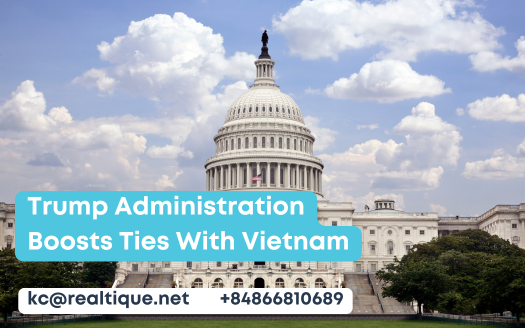Trump Administration Boosts Ties With Vietnam
The Trump administration’s strategic effort to strengthen relations with Vietnam, amid rising geopolitical intricacies, has opened up a new dimension in international relations. This move, accentuating military collaboration and an independent foreign policy, is seen as a calculated approach to maintain equilibrium in the Asia-Pacific region. The unfolding interactions of this US-Vietnam partnership begs the question: How does this relationship influence the regional power balance and what might be its implications on the wider diplomatic environment?
Table of Contents
Importance of U.S.-Vietnam Relations
While the Trump administration has had its unique approach to foreign relations, it has nonetheless recognized Vietnam as an essential strategic partner.
This recognition stems from a shared commitment to regional stability, security, and the importance of an independent foreign policy approach. The administration’s focus on strengthening military collaboration and acknowledging Vietnam’s diversification in international partnerships highlights the strategic significance of this relationship.
The growing alliance between the two nations also emphasizes the U.S. desire to maintain a balance of power in the Asia-Pacific region.
In essence, the U.S.-Vietnam relationship, under the Trump administration, has been characterized by a mutual understanding of strategic interests, a commitment to regional security, and the need for diversified international partnerships.
Recent Diplomatic Engagements
In a significant diplomatic engagement, U.S. Defense Secretary Pete Hegseth met with his Vietnamese counterpart, Defense Minister Phan Van Giang, on February 7.
This high-level discussion aimed to enhance defense ties and investigate avenues for military cooperation. The dialogue revolved around mutual security interests and challenges, with both nations displaying a commitment to continued exchanges and consultations.
A focus was placed on attaining practical outcomes from bilateral meetings and agreements, signaling a deepening relationship between the two countries.
This meeting was a clear demonstration of the Trump administration’s goal to strengthen ties with Vietnam, and the importance it places on the Southeast Asian nation as a strategic partner.
These engagements serve to fortify the U.S.-Vietnam alliance in a rapidly changing geopolitical environment.
Historical Context and Military Cooperation
Given the significant historical ties between the United States and Vietnam, military cooperation between the two nations has been marked by efforts to address war-related legacies.
To promote reconciliation and progress, three key joint initiatives have been undertaken:
Dioxin Remediation: The U.S. has supported Vietnam in the cleanup of dioxin contamination at Bien Hoa Airport, a significant legacy of the Vietnam War.
Assistance to Veterans: The two nations have cooperatively implemented initiatives to assist disabled veterans, offering mutual support and understanding.
Unexploded Ordnance Clearance: The U.S. and Vietnam jointly work on clearing unexploded ordnance, ensuring the safety of Vietnamese communities and symbolizing a shared commitment to overcoming the past.
Strategic Goals and Future Cooperation
Looking forward, Vietnam has expressed its intention to sustain high-level exchanges with the U.S. defense sector, highlighting the importance of this relationship in its strategic goals.
This commitment is an extension of its ongoing defense policy dialogues, emphasizing the importance of mutual understanding in addressing regional security challenges.
Future cooperation is expected to continue with the 13th Defense Policy Dialogue, slated to be hosted by Vietnam. This platform aims to enhance bilateral defense ties and seek practical outcomes from agreements.
The strengthening of these ties is seen as essential for the interests of both nations. It is a reflection of Vietnam’s diversification in international partnerships and the U.S.’s recognition of Vietnam as a key partner in strategic collaboration.
Broader Implications for Regional Security
The broader implications of U.S.-Vietnam cooperation extend beyond bilateral relations, significantly impacting regional security interactions.
Balancing regional power interactions: As China becomes increasingly assertive in the South China Sea, the U.S.-Vietnam partnership offers a counterbalance, strengthening regional stability and security.
Promoting a rules-based order: This cooperation encourages respect for international law and maritime freedoms, key principles for a peaceful and prosperous Indo-Pacific region.
Creating a model for U.S.-Southeast Asia Relations: The U.S.-Vietnam partnership serves as a blueprint for America’s relations with other Southeast Asian nations, demonstrating how strategic alignment can encourage a safer, more secure region.
In essence, this alliance not only serves the national interests of both countries but also contributes to the broader peace and stability in the region.





